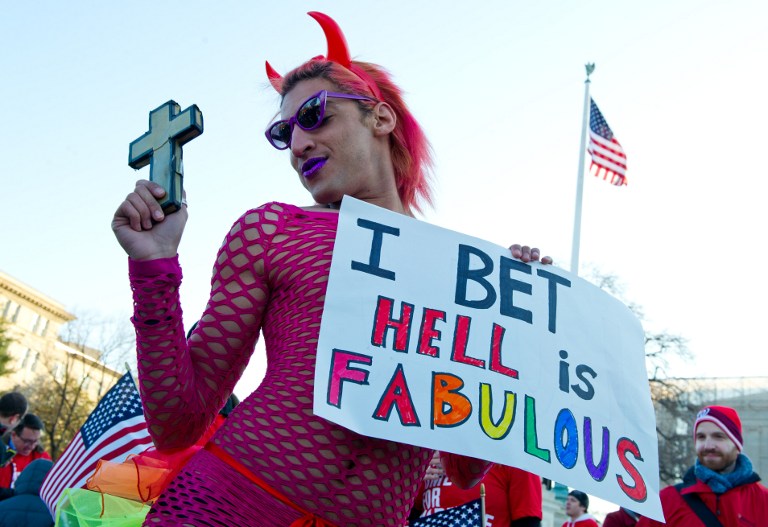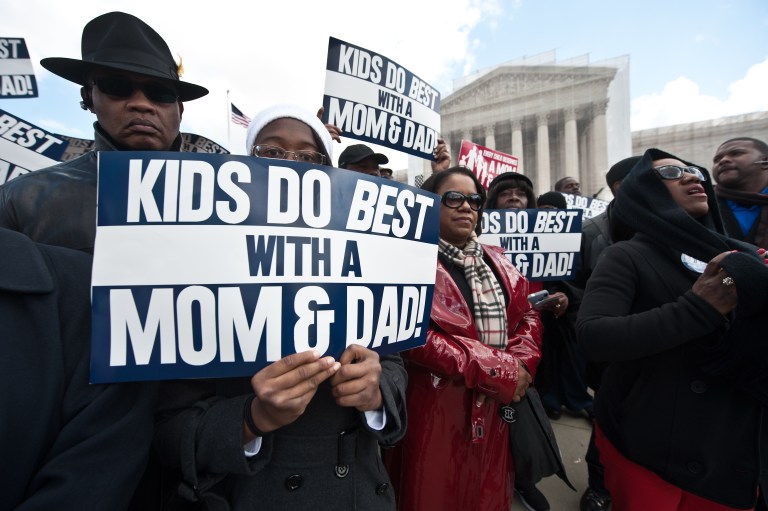On a day long awaited by both sides of the debate, thousands of gay rights advocates waving US and rainbow flags descended on the court, outnumbering a rally of religious activists opposed to same-sex marriage.
The Supreme Court will take months to issue a ruling, but several justices indicated during their 80-minute debate that they would be in no hurry to issue a verdict that could extend the right to same-sex marriage to the entire country.
Justice Anthony Kennedy voiced reluctance for the court to step into "uncharted waters" on a case involving California law. His remarks are closely watched as he is often the swing vote on the nine-member bench.
Kennedy said there was a lack of sociological data to judge the effect of same-sex marriage. "We have five years of information to weigh against 2 000 years of history or more," he added.
But he also expressed sympathy for an estimated 40 000 children living in California with same-sex couples. "They want their parents to have full recognition and full status," he said.
Both Kennedy and Justice Sonia Sotomayor wondered out loud whether the Supreme Court should have agreed to hear the case at all.
"The problem with this case is that you're really asking … for us to go into uncharted waters," Kennedy told Theodore Olson, one of the lawyers arguing against the ban.
'Lack of data'
Olson, a staunch conservative, served as US solicitor general from 2001 to 2004 under former president George W Bush.
Justice Samuel Alito, a conservative, also spoke of a "lack of data" on same-sex marriage since it was first legalised in the Netherlands in 2001.
He said: "You want us to step in and render a decision based on an assessment of the effects of this institution which is newer than cellphones or the internet?"
Liberal justices argued it was discriminatory to define marriage solely by whether a couple can bear children. Justice Elena Kagan said that by the same argument, the government could ban marriages of couples above age 55.
Nine US states and the capital Washington allow same-sex marriage. While some rights advocates hope the Supreme Court will guarantee gay marriage across the United States, its opponents wanted to leave the decision to state lawmakers.
California law
The top court is hearing two cases.
The first concerns the constitutionality of California's proposition 8, the ballot initiative through which in 2008 voters ended right to same-sex marriage in the nation's most populous state.
Sandy Stier, one of plaintiffs, said the referendum had hurt her family by invalidating her marriage. She and her partner, Kris Perry, have four sons.
"I, like all Americans, believe in equality. I also believe in our judicial system and I have great faith in it. But more than anything, I believe in love," Stier said on the Supreme Court steps.
"It is our hope that we can move forward and remove this harm from society so that gays and lesbians in California can go back to their lives living equally alongside their neighbours with the same rights and protections."
On Wednesday, the court will consider the Defence of Marriage Act, a federal law which defines marriage as an act between a man and woman.
Protestors
Outside the Supreme Court protesters from both sides of the debate set out their positions. One demonstrator dressed in pink and danced to music of Lady Gaga, the superstar singer and supporter of gay rights.

Among opponents, protesters pushed strollers and chanted: "Every child deserves a mom and dad."
"All people are capable of loving children, but all the love in the world can't turn a mother into a father or a father into a mother," said Cathy Ruse of the Family Research Council, a conservative Christian group.

Opinion polls have repeatedly indicated that most Americans now accept the principle of same-sex marriage, including an overwhelming majority of younger Americans.
US President Barack Obama in May 2012 became the first US president to publicly back gay marriage.
White House spokesperson Jay Carney declined to predict how the supreme court would rule, but added that the treatment of gay and lesbians "goes to core principles about who we are as a country." – AFP